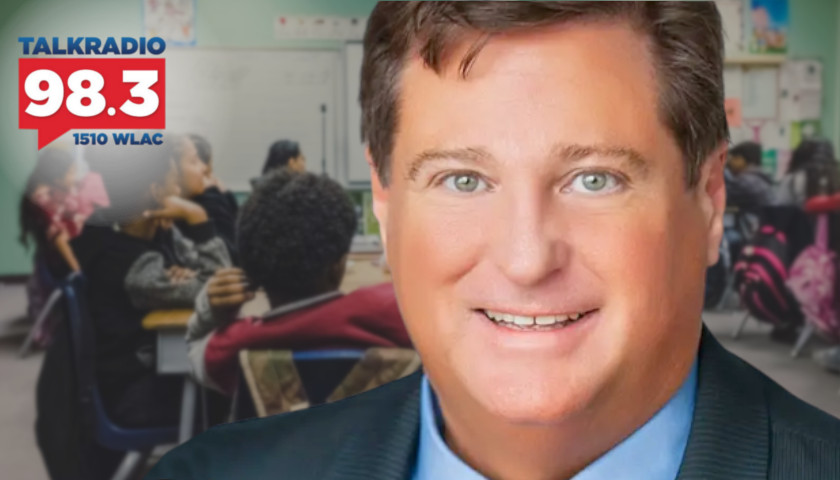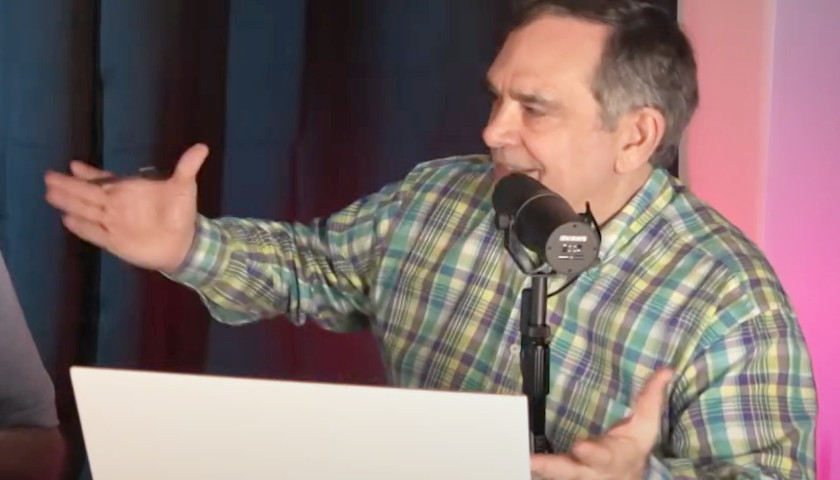Live from Music Row, Wednesday morning on The Tennessee Star Report with Michael Patrick Leahy – broadcast on Nashville’s Talk Radio 98.3 and 1510 WLAC weekdays from 5:00 a.m. to 8:00 a.m. – host Leahy welcomed Professional Educators of Tennessee President J.C. Bowman in the studio to examine the large percentage of public-school student dropouts across the state.
Leahy: In the studio, our good friend for many, many years, with Professional Educators of Tennessee, Mr. J.C. Bowman.
Bowman: Hey, good to be with you, Michael. Always early. Yes, I love it.
Leahy: I know, we get going here. And of course, Professional Educators of Tennessee, you were one of the first advertisers with us way back when and when we first started. So we really appreciate that support.
Bowman: Unlike some of your friends down in Williamson County, like the school board (laughter), we believe in freedom of speech, and we love it. And one of the things you’ve done, and I really admire that part of it, is you’ve given a platform for people that have been told to go sit in a corner and not speak out or say things. And even though sometimes we may disagree on an issue or something, but you’re always civil, and you’re like, okay, J.C., tell me why you got this spin on it, or whatever.
Leahy: It’s interesting you say that, because what we try and do is we try to have influence with people, and good people can disagree on topics. And just because you disagree doesn’t mean that you’re not friends.
Bowman: No. And for me, I’m a policy writer. That’s what I love, policy. I’m not as much into politics, I’m a policy guy. And so for me, I never personalized policy.
And so I just like, you know, I’ve always understood that I may disagree with somebody on something, and 10 minutes later, I’m agreeing with them on the next issue.
Leahy: And we have, on the issue of education, which is a top issue for us and for you, of course, there are many members of the Tennessee General Assembly with whom we agree, and some we disagree. But those we disagree with, we have them in here.
We have a nice civil discussion, and we talk about problems and solutions. Now, there are many problems with our K-12 public education system here. One of them, which I didn’t know about until you told me literally this morning, is that there’s a huge dropout rate among kids. Tell us what you found.
Bowman: Yes, so it is a huge issue. The comptroller did a report on it about two years ago. We looked at it, and the report went unnoticed because it was in the middle of COVID and they identified a couple of things. There is chronic absenteeism, and then there’s truancy.
Leahy: What’s the difference between chronic absenteeism and truancy?
Bowman: Chronic absenteeism is when you’re just out of school or whatever, and it could be an unexcused or excused absence. But you’re not in school. Truancy is when you have 10 percent, which is 18 days of unexcused absences.
So what happens is 146 school districts in Tennessee, there are 146 different policies. Some districts say if you miss five straight days, that’s fine, whatever. And others say you have to have a note from a doctor and all sorts of things.
Leahy: And just to put this in context, there are basically a million-plus K-12 public school students in Tennessee.
Bowman: Absolutely.
Leahy: In 146 school districts here in Middle Tennessee. Examples of a school district are Metro Nashville, that’s one school district. Williamson County is another. The City of Franklin Special School District is another.
Bowman: That’s all of them that are there. And you’ve got Maury, all of the ones that go up through here. And you’re looking at the state average is 8.8 percent.
Leahy: Whoa! Dropout?
Bowman: Dropout, 8.8 percent.
Leahy: To me, that’s extraordinarily high. Why is it so high?
Bowman: I would argue that it’s actually higher, Michael, because one of the things that we see is if a child moves to home school, they come in and go, well, Sally is leaving school today. She is home-schooled. And for the school districts, like, hey, great. Sally moved to home schooling. Boom, she’s gone.
Leahy: Do they still get the money for that?
Bowman: No, they lose it after a time. But that’s why the whole argument with TISA …
Leahy: TISA is the new formula that’s funding schools that are coming out.
Bowman: Right. That’s why it’s going to be dangerous.
Leahy: We are currently under the Basic Education Program. BEP. And this is all about how the state allocates its money to these different 146 school systems.
Bowman: Absolutely. So you have to be there to get the money. When they’re withdrawn, they don’t count against your statistics.
So that’s one of the numbers. And so kids fall through the cracks all the time. My fear is we don’t know how many kids have actually fallen through the cracks.
Leahy: But 8.6 percent of high school kids have dropped out. That is not good. How does that compare to the country here in Tennessee, by the way?
Bowman: We’re in the mid-range. We’re right there.
Leahy: What do these kids do when they drop out?
Bowman: They’ve set themselves up for failure in life. Here’s the other thing. We’re seeing a lot of poor kids that need that income. And so they’re going to work.
Leahy: Are they going to work?
Bowman: They’re working in fast food and places like that. They need the money. They see the lure of $400 a week. And for a family, whatever comes in. And if you’re a single mom homes’ and they’re trying to help make ends meet for the family.
Some of them drop out, particularly some of the large migrant population that’s pulled here. Some of those kids aren’t in school. And so we see a lot of problems with that. But you’re looking at here, just in Davidson County alone, your dropout rate is 16.2 percent.
Leahy: 16.2 percent?
Bowman: Yes.
Leahy: Wow.
Bowman: These are kids and they drop out. You’ve got Giles County is 13.9 percent. Houston County is 27 percent.
Leahy: What is Shelby County? Pretty high?
Bowman: I’m guessing. I have to go over to it, but I’ve got the numbers. It is a whopping number. Let me go into it.
Leahy: We’re looking at this data in real time, folks.
Bowman: I think it would be a great thing to publish, but man, it is going to be hard to get out there. And I’m still hunting it because it’s in no particular order.
Leahy: But here’s the thing, let’s take a look at, what do they do? I would guess if you drop out, you’re actually probably not a high performer in reading, writing, and arithmetic, right?
Because the proficiency levels overall have gone down from like 35 percent to like, 28 percent at the broadest level. And so the dropouts are probably the ones who are lowest-performing.
Bowman: But some of them are very bright kids. And here’s one of the things. I have no problem criticizing the government. I will say the vocational thing early on, was – by the way, Shelby County was 18.9 percent.
So vocational, they don’t fit in the typical British lit, American literature, whatever. They are vocational, and so they’re not there.
Listen to today’s show highlights, including this interview:
– – –
Tune in weekdays from 5:00 – 8:00 a.m. to The Tennessee Star Report with Michael Patrick Leahy on Talk Radio 98.3 FM WLAC 1510. Listen online at iHeart Radio.
Photo “J.C. Bowman” by J.C. Bowman.








